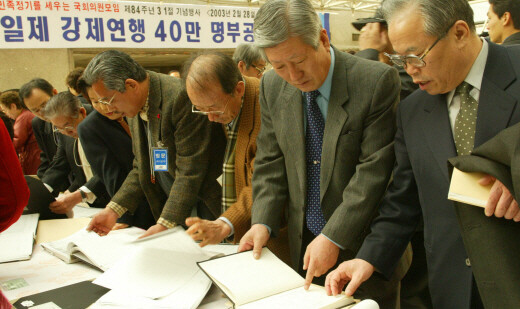hankyoreh
Links to other country sites 다른 나라 사이트 링크
Court ruling casts doubt on Japanese compensation for forced mobilization

A court ruling has cast doubt on the constitutionality of wages payments that were not received from the Japanese government and companies by Koreans dragged overseas during the colonial era based on a “1 Yen-2,000 Won” exchange rate. The court has called it insufficient compensation considering the rise of inflation. Each time there has been controversy over the size of the payment, the Japanese government has claimed that the money is not “compensation,” but “symbolic consolation money.”
On Friday, Seoul Administrative Court decided to accept a petition submitted by a Mrs. Shin (78), the widow of Kim Hong-jun, a conscripted laborer of Japan’s forced mobilization, to review the constitutionality of a law designed to support victims of Japan’s forced mobilization overseas around the time of the Pacific War. The petition claims the law violates the constitutional guarantee of property rights.
Paragraph 1 of Article 5 of the law reads, “The state shall pay the victims or their bereaved families their unpaid wages based on a rate of 2,000 Won to the yen.” Accordingly, the committee that handles support for the victims last year decided to pay Shin 540,000 Won ($449), or 2,000 Won for every yen of her husband’s 270 yen in unpaid wages. Shin filed to cancel the disposition and filed for a review of the constitutionality of the law.
It its decision, the bench decided that first, in the 1965 treaty between Korea and Japan, victims of unpaid wages were excluded from compensation. Second, that they had taken into consideration that this money was paid for the first time following the treaty by the state, which has the duty to pay compensation. Third, the 1 Yen-2,000 Won was decided on prices and exchange rates in 1975 according to civilian compensation. Fourth, between 1945 and 2000, consumer prices in South Korea have increased 93,000-fold, and the money should be viewed as compensation, and it is therefore difficult to view 1 yen-2,000 won as fair compensation.
Lawyer Choi Bong-tae, who handled the case, said a wage of 99 Yen at that time could buy two cows, and the price of cows has increased 140,000-fold since then. Meanwhile, wages not received from the Japanese government or companies by Korean victims of the forced mobilization total 364.6 million yen.
Please direct questions or comments to [englishhani@hani.co.kr]
Editorial・opinion
![[Column] Park Geun-hye déjà vu in Yoon Suk-yeol [Column] Park Geun-hye déjà vu in Yoon Suk-yeol](https://flexible.img.hani.co.kr/flexible/normal/500/300/imgdb/original/2024/0424/651713945113788.jpg) [Column] Park Geun-hye déjà vu in Yoon Suk-yeol
[Column] Park Geun-hye déjà vu in Yoon Suk-yeol![[Editorial] New weight of N. Korea’s nuclear threats makes dialogue all the more urgent [Editorial] New weight of N. Korea’s nuclear threats makes dialogue all the more urgent](https://flexible.img.hani.co.kr/flexible/normal/500/300/imgdb/original/2024/0424/7317139454662664.jpg) [Editorial] New weight of N. Korea’s nuclear threats makes dialogue all the more urgent
[Editorial] New weight of N. Korea’s nuclear threats makes dialogue all the more urgent- [Guest essay] The real reason Korea’s new right wants to dub Rhee a founding father
- [Column] ‘Choson’: Is it time we start referring to N. Korea in its own terms?
- [Editorial] Japan’s rewriting of history with Korea has gone too far
- [Column] The president’s questionable capacity for dialogue
- [Column] Are chaebol firms just pizza pies for families to divvy up as they please?
- [Column] Has Korea, too, crossed the Rubicon on China?
- [Correspondent’s column] In Japan’s alliance with US, echoes of its past alliances with UK
- [Editorial] Does Yoon think the Korean public is wrong?
Most viewed articles
- 1‘We must say no’: Seoul defense chief on Korean, USFK involvement in hypothetical Taiwan crisis
- 2N. Korean delegation’s trip to Iran shows how Pyongyang is leveraging ties with Moscow
- 3Amnesty notes ‘erosion’ of freedom of expression in Korea in annual human rights report
- 4[Column] Park Geun-hye déjà vu in Yoon Suk-yeol
- 5‘Weddingflation’ breaks the bank for Korean couples-to-be
- 6[Reportage] On US campuses, student risk arrest as they call for divestment from Israel
- 7[Editorial] New weight of N. Korea’s nuclear threats makes dialogue all the more urgent
- 8Why Korea shouldn’t welcome Japan’s newly beefed up defense cooperation with US
- 9[Guest essay] The real reason Korea’s new right wants to dub Rhee a founding father
- 10Will NewJeans end up collateral damage in internal feud at K-pop juggernaut Hybe?